Welcome! Ready to discover Duisburg? Tucked away in the western part of Germany, this industrious city might not be on every traveler’s radar, but it’s packed with surprises that defy expectations. Duisburg marries a rich industrial heritage with sprawling green spaces, modern art, and a multicultural vibe that’s as welcoming as it is intriguing. Let’s dive into the heart of the Ruhr Valley and uncover the layers of Duisburg’s unique charm.
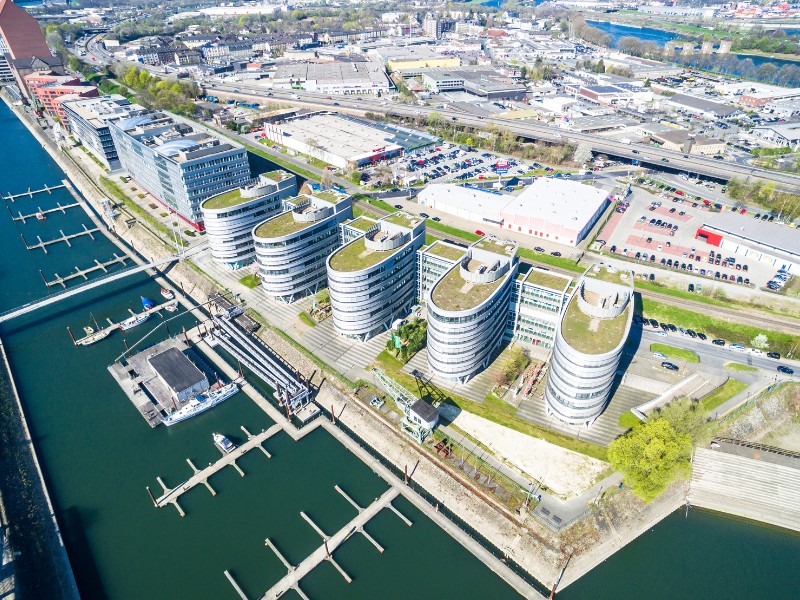
A City Shaped by Industry and Nature
Duisburg’s story is one of transformation. Once a giant in the coal and steel industries, the city has reinvented itself, weaving its industrial past into a vibrant cultural tapestry. The Landschaftspark Duisburg-Nord, a public park built on a decommissioned steel mill, symbolizes this shift perfectly. Here, blast furnaces serve as climbing walls, and old gasometers are now diving pools. It’s a place where history meets recreation head-on.
A Cultural Melting Pot
Duisburg’s streets buzz with a multicultural energy, a testament to its diverse community. From Turkish bazaars to Portuguese festivals, the city celebrates its international influences with flair. Foodies rejoice! The local culinary scene is a delightful journey through global cuisines, offering everything from authentic German dishes to Turkish kebabs and beyond.
Green Spaces Galore
Believe it or not, Duisburg is also a haven for nature lovers. The city is home to the Six Lakes Plateau (Sechs-Seen-Platte), a beautiful recreational area perfect for hiking, swimming, and sunbathing. Whether you’re looking to relax by the water or explore serene woodlands, Duisburg’s green spaces provide a peaceful escape from urban life.
Art and Events
Duisburg’s cultural calendar is brimming with events, from the renowned Duisburg Film Week to vibrant street festivals that light up the city. The Lehmbruck Museum, dedicated to modern sculpture, is a must-visit for art enthusiasts, showcasing works that challenge and inspire.
Duisburg: More Than Meets the Eye
So, why visit Duisburg? Because it’s a city that surprises you. It’s a place where industrial grit meets green serenity, where global cultures come together, and where art and history are alive in the streets. So, pack your bags (and maybe some preconceptions) and get ready to explore Duisburg.
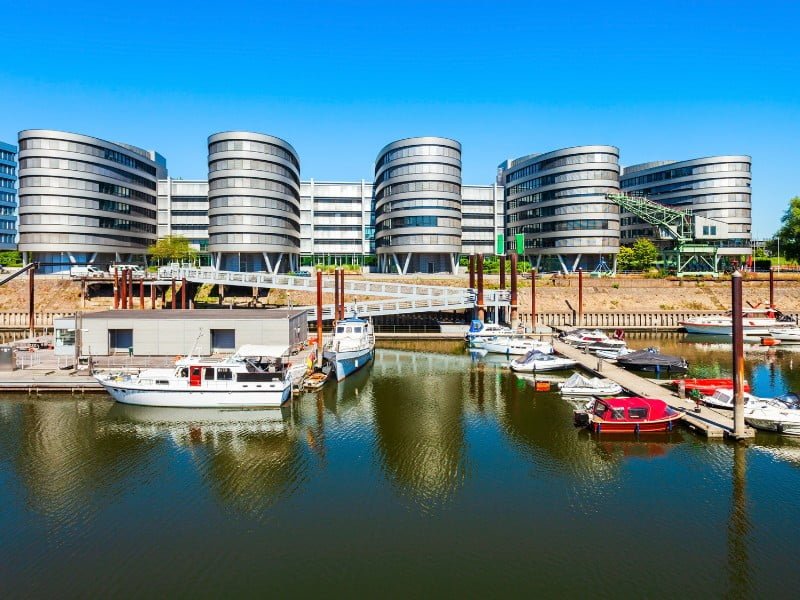
Duisburg City Guide: A Brief History Of Duisburg, Germany
Curious about how Duisburg evolved from a quiet Roman settlement to one of Germany’s most dynamic cities? So, grab a cup of coffee. And let’s embark on a quick journey through time, exploring the milestones that shaped Duisburg into the city it is today.
Ancient Beginnings and Medieval Might
Rome’s Far Reach: Duisburg’s story kicks off in the 5th century, with its roots as a small but strategic Roman outpost. Its location at the confluence of the Rhine and Ruhr rivers made it a prime spot for trade and military defense, laying the groundwork for its growth.
A Medieval Metropolis: Fast forward to the Middle Ages, and Duisburg had blossomed into a thriving medieval city. Granted city rights in 883, it became a key player in the Hanseatic League, Europe’s powerful network of merchant guilds and market towns, bolstering its status as a trading hub.
Industrial Revolution and War Time
The Iron Heart Beats: The 19th century heralded Duisburg’s transformation into an industrial behemoth. The discovery of coal in the Ruhr Valley fueled its ascent as a steel-producing titan. Factories sprouted, the population boomed, and Duisburg became the backbone of Germany’s industrial might.
Wartime Woes: The city’s strategic importance, unfortunately, made it a target during World War II, suffering significant damage. The resilience of its people shone through as they rebuilt from the ashes, turning tragedy into a catalyst for modernization and growth.
A New Chapter: Cultural Renaissance
Green Transformation: The closure of steel mills and coal mines in the late 20th century could have been a knockout blow. Instead, Duisburg turned its industrial heritage sites into cultural landmarks and green spaces. The Landschaftspark is a prime example, symbolizing the city’s knack for reinvention.
Cultural Hub: Today, Duisburg’s rich history melds with a vibrant cultural scene. It’s a place where art, music, and festivals thrive, where the past is honored, and the future eagerly embraced. The city’s diverse population adds layers of cultural depth, making it a mosaic of global influences.
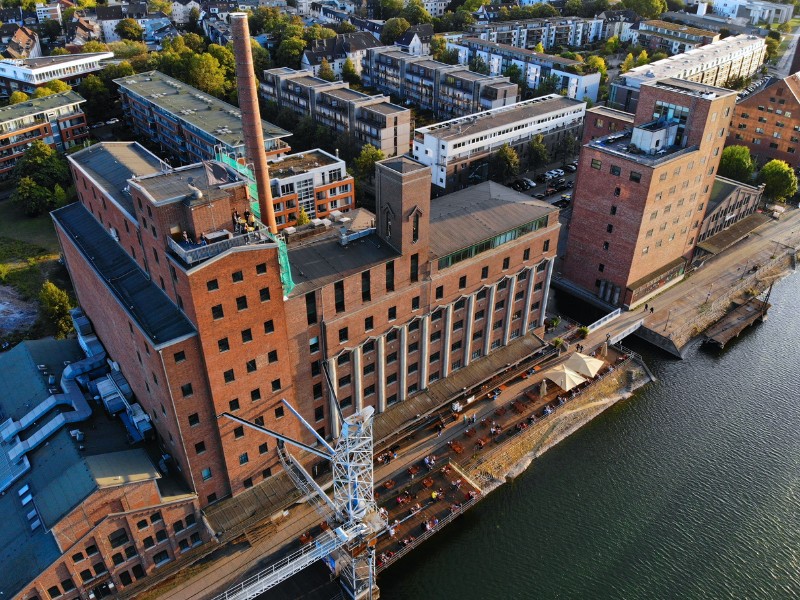
Duisburg Top Attractions and Best Places to Visit in Germany
Dortmund is a less-known German city. But Duisburg is even more under-the-radar. Most stumble upon it when visiting Landschaftspark, a famous historic industrial site. However, there’s so much more to this place than that.
In Duisburg, you’ll find amazing museums, parks, and a reworked waterfront. Don’t miss this off-the-beaten-track gem.
Are you looking for something different while in Duisburg? Landschaftspark, a former factory turned historic site, delivers just that. Fans of industrial grit will be in their element, as this former steel plant appears as it did when it shut down.
Apart from night-time art installations and safety improvements, it is what it is. Years ago, its structural steel helped build a nation. Climb to the top of its 80-metre tall blast furnace. From there, you’ll have amazing views over the site.
More Attractions
You’ll also find your next Duisburg attraction inside a former industrial work. However, Museum Küppersmühle instead features a fine collection of contemporary art. This former warehouse dates back to the mid 19th century. However, rather than foreign goods, it now holds works by Hans Uhlmann, Peter Brüning, and others.
When we wrote this guide, this attraction was closed for renovations. However, it’s currently slated to reopen in March 2021. Admission costs 9 EUR for adults, and 14 EUR for a family of four. Children under 16 are free.
Duisburg is far from the ocean. However, thanks to the Rhine River’s depth, ships used this city as a port throughout the Industrial Revolution. Learn more about this time at the German Inland Waterways Museum.
This institution sits in a gorgeous Art Nouveau building, which used to serve as a public bath. Where the men’s and women’s swimming pools used to exist, you’ll find two reconstructed boats. In other exhibits, you’ll learn the history of Duisburg as a port.
Out of town, take some time to check out Tiger & Turtle. This modern piece of art resembles a roller-coaster but is actually a series of twisted staircases. In spots, the steps invert, so you won’t be able to walk the whole thing.
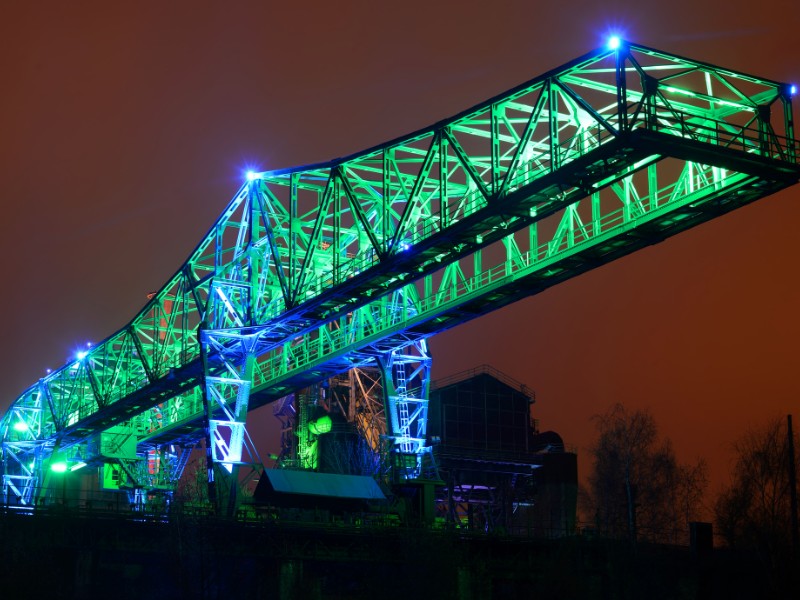
Other Cultural Attractions: Trip to Duisburg, Germany
Travelling as a family? Make time for a visit to the Duisburg Zoo. This complex is among the largest in Germany, with over 2,100 animals representing 280 species. This particular park is known for two species in particular – its dolphins and its koalas.
Admission is 24 EUR for families. Try to visit during the week, as this attraction is busy on weekends. Sunday is especially jammed, as few other things are open on this day.
Need to relax for a bit in nature? Spend some time unwinding at Sechs-Seen-Platte – the most beloved urban park in Duisburg. This park protects six lakes located just south of Duisburg city centre. As a result, this place is popular with boaters during the summer months.
Other Attractions
The city does not allow swimming in the lakes. However, an outdoor swimming pool near Wolfssee Lake gives the public a place to cool off. Climb this park’s 23-metre high steel observation tower for sweeping views over this park and the city.
Germans love football (soccer). So much so, that buying one Bundesliga ticket can cost a fortune. However, in Duisburg, it’s still possible for entire families to take in a live match at Schauinsland-Reisen-Arena.
The home team, MSV Duisburg, plays in Germany 3rd tier league. As a result, prices are much more reasonable. Want to take in a game? You’ll pay 12 EUR for standing room tickets, or 34 EUR for seats in the lower bowl.
Wind down your visit to Duisburg by spending an evening in the Inner Harbour. In its heyday, this was a busy port, with workers importing and exporting goods to/from ships. By 1960, the area fell into disuse. By the 1990s, though, things began to turn around. Today, you’ll find many restaurants and bars by Duisburg’s waterfront.
source: Top Tourist Places on YouTube
Top 28 Things To Do in Duisburg, Germany For Visitors
Here are the top 28 things to do in Duisburg:
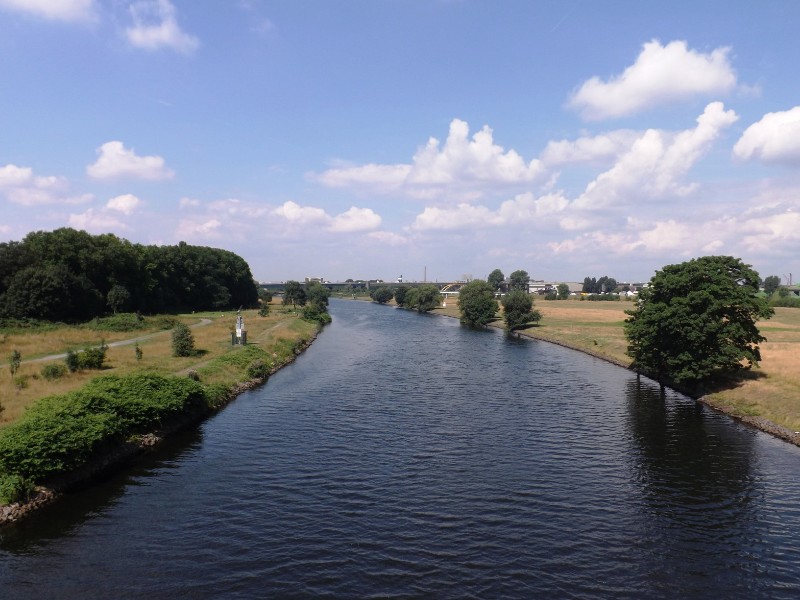
1. Visit the Landschaftspark Duisburg-Nord
Landschaftspark Duisburg-Nord is a prime example of industrial transformation, turning a former steel plant into a multi-use public park. Visitors can climb old furnaces, explore gasometers, and even go diving in flooded bunkers. At night, the park is illuminated with colorful lights, creating a stunning display. It’s a must-see attraction that showcases the fusion of nature and industrial heritage.
- Industrial heritage: Explore repurposed furnaces and bunkers.
- Nighttime lights: Enjoy the mesmerizing illuminated structures.
- Recreational activities: Rock climbing, diving, and walking trails.
2. Explore the Duisburg Zoo
Duisburg Zoo is famous for its dolphinarium and the Koala House, home to one of Germany’s only koalas. It houses over 10,000 animals across various species, making it a great destination for families. The zoo emphasizes conservation and education, allowing visitors to learn about endangered species. With its beautiful layout and rich biodiversity, it’s both an entertaining and educational experience.
- Dolphinarium: Watch dolphins in action at the zoo’s main attraction.
- Koala House: Visit one of the few zoos in Germany with koalas.
- Family-friendly: A great destination for children and animal lovers.
3. Enjoy a Day at the Sechs-Seen-Platte (Six Lakes Plateau)
The Sechs-Seen-Platte is a tranquil area with six interconnected lakes, offering activities like swimming, sailing, and fishing. It’s perfect for a peaceful escape with scenic walking and cycling paths. Visitors can also enjoy picnics by the lakes or spot wildlife, especially birds. This recreational area is ideal for families and nature lovers seeking a break from the urban environment.
- Lakeside fun: Swim, sail, or fish in the serene lakes.
- Nature trails: Walk or bike along scenic paths.
- Birdwatching: A haven for bird enthusiasts.
4. Discover the Inner Harbor (Innenhafen)
Duisburg’s Inner Harbor is a prime example of urban renewal, transforming an old industrial port into a vibrant area filled with restaurants, cafes, and modern architecture. The harbor is home to museums, exhibitions, and hosts events throughout the year. A stroll along the water at sunset offers stunning views of the revitalized cityscape. It’s a perfect blend of history and modernity.
- Urban regeneration: Explore the city’s revitalized waterfront.
- Dining and shopping: Enjoy restaurants and boutique shops along the harbor.
- Cultural events: Attend exhibitions and festivals throughout the year.
5. Visit the Museum Küppersmühle (MKM)
Located in the Inner Harbor, the Museum Küppersmühle features a vast collection of modern and contemporary art housed in a former grain mill. The museum is known for its exhibitions of German and international artists, offering a cultural experience for art enthusiasts. The blend of industrial architecture and contemporary art creates a visually striking space. It’s a must-visit for anyone interested in the modern art scene.
- Modern art: Explore works by renowned artists from Germany and beyond.
- Architectural fusion: A former grain mill turned into a contemporary art museum.
- Temporary exhibitions: Always something new to discover.
6. Stroll Through the Duisburg Botanical Garden
Escape into the peaceful Duisburg Botanical Garden, where you can wander through themed areas, such as the Japanese garden or medicinal herb garden. It’s a relaxing space perfect for nature lovers and those seeking a serene atmosphere. The garden also hosts seasonal events, making each visit unique. It’s an oasis of calm in the bustling city.
- Themed gardens: Explore Japanese landscapes and herb collections.
- Educational tours: Learn about diverse plant species from around the world.
- Seasonal events: Attend festivals and gardening workshops.
7. Experience the Tiger & Turtle – Magic Mountain
The Tiger & Turtle – Magic Mountain is a walkable rollercoaster sculpture that offers panoramic views of Duisburg and the surrounding areas. The unique structure is a thrilling piece of public art that combines sculpture with leisure. At night, LED lights illuminate the sculpture, making it an even more impressive sight. Climbing this iconic landmark provides breathtaking views of the city, especially at sunset.
- Walkable rollercoaster: A unique blend of art and adventure.
- LED lighting: Enjoy the illuminated structure at night.
- Panoramic views: Stunning vistas of Duisburg and beyond.
8. Delve into History at the Culture and Local History Museum (Kultur- und Stadthistorisches Museum)
Housed in a historic granary, the Culture and Local History Museum explores Duisburg’s journey from its Roman roots to its industrial rise. The museum features medieval artifacts, historical documents, and displays on the city’s development. There’s also a section dedicated to Gerhard Mercator, the famous cartographer. It’s an insightful trip through the city’s rich history.
- Historical exhibits: Learn about Duisburg’s past through artifacts and documents.
- Mercator’s legacy: Explore the work of the famous cartographer.
- Interactive displays: Engaging for both adults and children.
9. Relax at Sportpark Duisburg
Sportpark Duisburg is a massive complex catering to all kinds of sports activities, from rowing and athletics to soccer. It’s popular among both professionals and amateurs looking for outdoor recreation. The park also has cycling and walking paths, making it ideal for a family day out. If you’re lucky, you might catch an international sporting event or competition during your visit.
- Athletic hub: Facilities for soccer, rowing, and more.
- Family-friendly: Enjoy walking, cycling, or picnicking in the park.
- International competitions: Watch top athletes compete.
10. Admire Modern Architecture at the Landschaftspark Duisburg-Nord
The Landschaftspark Duisburg-Nord not only serves as a recreational park but is also a marvel of modern architecture and landscape design. Guided tours offer a deeper understanding of the park’s industrial heritage and its stunning transformation. The park is a testament to Duisburg’s ability to blend the old and the new seamlessly. It’s an inspiring space for architecture and design lovers.
- Architectural fusion: Industrial structures meet innovative landscape design.
- Guided tours: Learn about the park’s history and unique architecture.
- Contemporary installations: Explore modern art within an industrial setting.
11. Take a Boat Tour on the Rhine
A boat tour on the Rhine offers a fresh perspective of Duisburg’s industrial heart and natural beauty. The tours cover the city’s significance as one of the world’s largest inland ports and its role in global trade. You can sit back and enjoy the scenic landscapes while learning about Duisburg’s history. It’s a relaxing and informative way to see the city.
- Scenic views: Enjoy Duisburg’s skyline from the water.
- Historical insights: Learn about the city’s industrial importance.
- Leisurely experience: A calming way to explore Duisburg’s waterways.
12. Explore the Mercator Quarter
Named after Gerhard Mercator, the renowned cartographer, the Mercator Quarter is a charming historic district in Duisburg. Visitors can admire Renaissance-era architecture, visit the Mercator fountain, and explore the Mercatorhalle, a beautiful concert hall. This area celebrates the city’s connection to one of the greatest mapmakers in history. It’s a mix of history, art, and culture in the heart of the city.
- Historic district: Walk through streets rich in history.
- Mercator’s legacy: Learn about the famed cartographer’s life and work.
- Cultural hub: Attend a concert at the Mercatorhalle.
13. Visit the Wilhelm Lehmbruck Museum
The Wilhelm Lehmbruck Museum is dedicated to modern sculpture and features the works of Wilhelm Lehmbruck and other prominent artists. The museum’s spacious halls complement the large-scale sculptures on display. Temporary exhibitions and workshops add to the museum’s dynamic cultural offerings. It’s a must-visit for anyone interested in the evolution of modern sculpture.
- Sculpture collection: Admire the works of Wilhelm Lehmbruck and other artists.
- Temporary exhibits: Always something new to explore.
- Cultural workshops: Participate in educational art programs.
14. Attend the Duisburg Philharmonic Orchestra
Experience world-class music at the Duisburg Philharmonic Orchestra, held in the prestigious Mercatorhalle. The orchestra is known for its exceptional performances of both classical and contemporary works. The acoustically perfect concert hall adds to the experience, making every performance a delight. It’s a cultural treat for music lovers visiting Duisburg.
- Orchestra performances: Enjoy classical and contemporary music.
- Renowned venue: Attend a concert in the beautiful Mercatorhalle.
- Cultural enrichment: A must for those who appreciate live music.
15. Shop at Forum Duisburg
Forum Duisburg is one of the largest shopping centers in the city, offering everything from international brands to local boutiques. Whether you’re looking for fashion, electronics, or home goods, you’ll find it here. The mall also has numerous dining options, making it a great place to grab a meal after a day of shopping. It’s a convenient one-stop destination for all your retail needs.
- Wide range of stores: Shop for clothing, electronics, and more.
- Dining options: Enjoy local and international cuisine.
- Eventful atmosphere: Frequent promotions and events to enhance the experience.
16. Unwind at Toeppersee
Toeppersee is a serene lake located in the southern part of Duisburg, offering plenty of opportunities for swimming, sailing, and relaxing by the water. The area is popular for family picnics and outdoor activities like beach volleyball and fishing. Walking and biking paths surround the lake, making it a peaceful spot to enjoy nature. It’s the perfect place to escape the hustle and bustle of the city.
- Recreational area: Enjoy swimming, sailing, and picnicking by the lake.
- Outdoor sports: Play beach volleyball or go fishing.
- Walking and biking paths: Ideal for a relaxing nature stroll or bike ride.
17. Participate in the Duisburg Christmas Market
The Duisburg Christmas Market turns the city center into a festive wonderland every winter. With stalls selling handmade crafts, holiday decorations, and traditional German treats like mulled wine and bratwurst, it’s a lively destination for holiday cheer. A large ice-skating rink and a Ferris wheel provide extra fun for families. The market’s twinkling lights and joyful atmosphere make it a must-see during the holiday season.
- Holiday shopping: Find unique gifts and holiday decorations.
- Festive activities: Enjoy ice skating and ride the Ferris wheel.
- Seasonal treats: Indulge in mulled wine, bratwurst, and gingerbread.
18. Learn at the Explorado Children’s Museum
The Explorado Children’s Museum is an interactive, hands-on museum designed to spark curiosity and learning in children. With exhibits on science, technology, and the human body, the museum encourages kids to explore and discover through play. It’s the perfect destination for families, offering fun yet educational experiences. The museum covers a wide range of topics, making learning engaging and exciting.
- Interactive exhibits: Fun hands-on activities for kids.
- Educational fun: Learn about science, technology, and the human body.
- Family-friendly: A great day out for families with young children.
19. Explore the Duisburg City Hall (Rathaus Duisburg)
The Duisburg City Hall is an architectural gem, known for its early 20th-century design and historical significance. Visitors can admire its detailed façade and, on special occasions, tour the inside, including the grand council chambers. The building plays a key role in the city’s political life and is a symbol of Duisburg’s growth and resilience. The plaza in front of the city hall is also a hub for public events and gatherings.
- Historical architecture: Admire the early 20th-century design.
- Public events: Attend gatherings in the city hall plaza.
- Civic center: Learn about Duisburg’s political and civic history.
20. Enjoy the Water Sports at Wedau Sports Park
Wedau Sports Park is a premier location for water sports enthusiasts, offering facilities for rowing, canoeing, and even water skiing. It’s a well-known venue for national and international competitions, but visitors can also enjoy the park’s walking trails and picnic areas. The park is not only for athletes but for anyone looking to enjoy outdoor activities. It’s a vibrant spot for both watching and participating in sports.
- Water sports: Try rowing, canoeing, or water skiing.
- International events: Watch top athletes compete.
- Recreational areas: Walk, picnic, or relax by the water.
21. Visit the Loveparade Memorial
The Loveparade Memorial in Duisburg commemorates the tragic event that occurred during the Love Parade festival in 2010. The site features 21 steel pillars representing the lives lost during the disaster, offering a place of reflection and remembrance. It’s a somber but important part of Duisburg’s history, and the memorial serves as a reminder of the need for safety at large public events. Visitors can pay their respects and learn about the impact the event had on the city.
- Memorial site: Honor the victims of the Love Parade tragedy.
- Place of reflection: A quiet spot for contemplation.
- Cultural significance: Learn about the event’s lasting impact on Duisburg.
22. Stroll Through Kaiserberg Park
Kaiserberg Park is one of the largest parks in Duisburg, offering a beautiful space for walking, jogging, and picnicking. The park’s lush landscapes and tree-lined paths provide a peaceful retreat from the city. There’s also a small zoo within the park, making it a hit with families. It’s a great place to relax, enjoy nature, and take in some fresh air.
- Lush greenery: A scenic place for walks and outdoor activities.
- Family-friendly: Visit the small zoo within the park.
- Relaxing atmosphere: A perfect retreat for a calm, leisurely day.
23. Explore the RheinPark
The RheinPark offers scenic views of the Rhine River and is a popular spot for locals to relax, exercise, or enjoy picnics. The park’s open spaces and playgrounds make it ideal for families, while its walking paths along the river offer stunning views of passing ships. During the summer, the park hosts outdoor concerts and festivals. It’s a lively and beautiful area to experience Duisburg’s riverside.
- Riverside views: Enjoy picturesque walks along the Rhine.
- Family-friendly: Perfect for picnics, playgrounds, and open spaces.
- Summer events: Attend outdoor concerts and festivals in the park.
24. Experience the Harbor Tour
Take a harbor tour to explore Duisburg’s impressive port, one of the largest inland ports in the world. The guided boat tours provide fascinating insights into the logistics, industry, and history of the port. It’s a unique way to see Duisburg’s industrial side while enjoying the views from the water. The tours are both educational and relaxing, making it a great option for curious visitors.
- Largest inland port: Learn about Duisburg’s role in global trade.
- Guided tour: Get insights into the city’s industrial backbone.
- Scenic views: Relax and enjoy the river landscapes.
25. Attend the Duisburger Akzente Arts Festival
The Duisburger Akzente is an annual arts festival celebrating theater, music, literature, and visual arts. The festival focuses on contemporary social issues, bringing together artists from around the world to engage in dialogue through their work. It’s one of Duisburg’s most important cultural events, offering a wide range of performances and exhibitions. For art lovers, it’s an enriching experience showcasing the best of Duisburg’s creative spirit.
- Cultural festival: Experience theater, music, and art from international artists.
- Social themes: Engage with contemporary social and cultural topics.
- Artistic diversity: Enjoy a variety of performances and exhibitions.
26. Discover the Six Lakes District (Sechs-Seen-Platte)
The Sechs-Seen-Platte, or Six Lakes District, is a beautiful recreational area created from gravel pits, offering pristine lakes perfect for swimming, sailing, and fishing. The interconnected lakes are surrounded by scenic trails for walking and cycling. It’s a peaceful escape into nature, where visitors can relax by the water or explore the lush surroundings. Birdwatching and picnicking are also popular activities here.
- Outdoor recreation: Swim, sail, or fish in the lakes.
- Scenic trails: Walk or cycle through nature.
- Wildlife watching: Spot birds and other wildlife.
27. Visit the MKM Museum Küppersmühle for Modern Art
The MKM Museum Küppersmühle showcases modern and contemporary art in a stunning building that once served as a grain mill. The museum houses an impressive collection of works by prominent German and international artists. The industrial architecture of the building adds to the museum’s unique atmosphere. It’s a must-see for art enthusiasts interested in the intersection of history and contemporary culture.
- Modern art: Explore collections from leading German and international artists.
- Architectural fusion: A historic grain mill turned into an art museum.
- Temporary exhibitions: Always something new to discover.
28. Watch a Performance at the Duisburg Theater
The Duisburg Theater is a cultural hotspot offering a variety of performances, including opera, ballet, drama, and musicals. Known for its excellent productions and collaborations with international artists, it’s a place where you can enjoy high-quality entertainment. The theater’s elegant architecture and world-class performances make it a cultural highlight in the city. Whether you’re a fan of the classics or contemporary works, there’s something for everyone.
- Diverse performances: Opera, ballet, drama, and more.
- World-class productions: Collaborations with international artists.
- Cultural experience: Enjoy the elegant setting and exceptional shows.

What To Eat and Drink in Duisburg, Germany
Duisburg is part of Westphalia. As such, you’ll find many dishes common to this region in this city’s restaurants. However, Duisburg is best known for Bratkartoffeln. Cooks prepare this potato-based dish by pan-frying them with ham, bacon, onions, and other vegetables.
Feeling brave? If you spot it on a menu, order some Steinfurter Töttchen. This dish got its start from butcher’s leftovers. Things like offal, calf’s head, and other non-premium cuts were cooked with onions and given to the less fortunate.
After dinner, give your day a sweet ending by enjoying some Butterkuchen. As the name suggests, pastry chefs make this cake primarily with butter and sugar. You’ll often find it topped with almonds and pieces of actual butter.
Let’s take a gastronomic tour through some must-try dishes and beverages in this dynamic city.
Traditional German Delights
1. Currywurst: Start your culinary adventure with a classic German street food. Currywurst is a savory delight, featuring a steamed then fried pork sausage cut into slices and seasoned with curry ketchup. It’s a simple yet satisfying dish, perfect for on-the-go eating.
2. Rheinischer Sauerbraten: This marinated pot roast, often made with beef (but sometimes with venison or lamb), is a beloved dish in the Rhineland. The meat is tenderized in a mixture of vinegar, water, and spices before being slow-cooked. It’s typically served with red cabbage and potato dumplings, making for a hearty, comforting meal.
3. Pfefferpotthast: A traditional Westphalian stew that packs a punch with its pepper seasoning. The dish consists of beef simmered in a broth with onions, anchovies, and a generous amount of pepper. It’s a warming dish, perfect for Duisburg’s chilly evenings.
International Cuisine
4. Turkish Kebabs and Mezes: Duisburg’s large Turkish community means you’re never far from an authentic kebab or a selection of mezes. These small dishes, perfect for sharing, include favorites like hummus, stuffed vine leaves, and eggplant salad.
5. Dutch Fries: Given Duisburg’s proximity to the Netherlands, Dutch-style fries are a popular snack. Thick-cut and served in a paper cone with a variety of toppings and sauces, they’re a must-try for potato lovers.
Local Brews and Beverages
6. Altbier: While Düsseldorf claims fame to Altbier, Duisburg is just a stone’s throw away and offers its own take on this traditional German beer. Dark, top-fermented, and with a hoppy taste, it’s a refreshing choice.
7. German Riesling: The Rhineland is known for its vineyards, and Duisburg is the perfect place to sample a glass of Riesling. This wine ranges from sweet to dry, making it a versatile companion to many dishes.
Sweet Treats
8. Apfelstrudel: For dessert, indulge in an Apfelstrudel. This traditional pastry is filled with tart cooking apples, sugar, cinnamon, and raisins, served warm with a side of vanilla ice cream or whipped cream.
9. Schneeballen: A fun and unique treat, Schneeballen, meaning “snowball,” consists of shortcrust pastry rolled into a ball, deep-fried, and then coated with powdered sugar or chocolate. It’s a delightful sweet to enjoy with a cup of coffee.
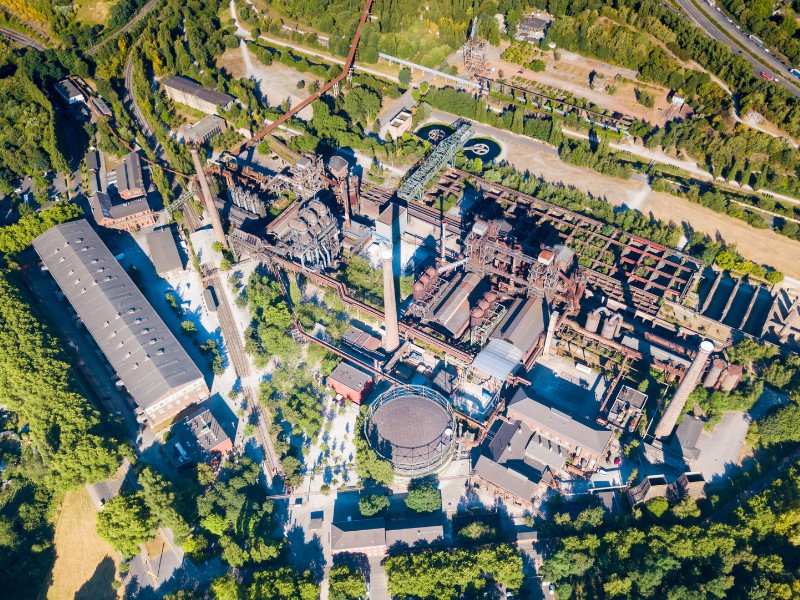
Tours For Visitors To Duisburg, Germany
Here’s a look at the types of tours and experiences you might find in a city like Duisburg, based on its known attractions and cultural offerings:
1. Landschaftspark Duisburg-Nord Tour
Discover the transformation of Duisburg’s industrial past into a green, public space. Tours of Landschaftspark might include guided walks explaining the history and architecture of the former steel mill, night tours showcasing the park’s dramatic lighting, or even diving excursions in the gasometer.
2. Harbor Boat Tours
Explore the world’s largest inland port on a guided boat tour. These tours provide insight into Duisburg’s historical and ongoing significance as a logistic hub, offering views of the docks, warehouses, and the bustling activity of the port.
3. Industrial Heritage Route
Join a cycling or bus tour along the Industrial Heritage Trail, which connects significant industrial landmarks across the Ruhr Valley, including Duisburg. It’s a fantastic way to understand the region’s industrial revolution and its impact on local culture.
4. Cultural and Historical City Walks
Embark on a walking tour through Duisburg’s city center and historic districts. These tours highlight architectural landmarks, historical sites, and stories from the city’s past, offering a glimpse into its development over the centuries.
5. Art and Museum Tours
With its vibrant art scene, Duisburg offers tours of its galleries, museums, and public art installations. Specialized tours might focus on contemporary art, local history, or specific exhibitions at places like the Lehmbruck Museum.
6. Culinary Tours
Experience Duisburg’s diverse culinary scene with a guided tasting tour. From traditional German fare to international cuisine reflecting the city’s multicultural community, these tours delight foodies looking to explore local flavors and culinary traditions.
7. Nature and Park Walks
Discover Duisburg’s green side with guided tours of its parks and natural reserves. These might include botanical tours, bird-watching walks, or leisurely strolls through scenic areas like the Six Lakes Plateau.
8. Zoo Duisburg Experience
For families and animal lovers, guided tours of Zoo Duisburg offer an educational and fun experience. Learn about conservation efforts, get up close with exotic animals, and discover the zoo’s role in international breeding programs.
9. Beer Tasting and Brewery Tours
Dive into Germany’s celebrated beer culture with a tour of local breweries in and around Duisburg. Learn about the brewing process, sample various beer styles, and hear stories from master brewers.
10. Sports and Adventure Activities
For those looking for a bit more adrenaline, Duisburg and its surroundings offer adventure tours, including climbing in the Landschaftspark, kayaking on the Ruhr River, or biking along the industrial heritage sites.
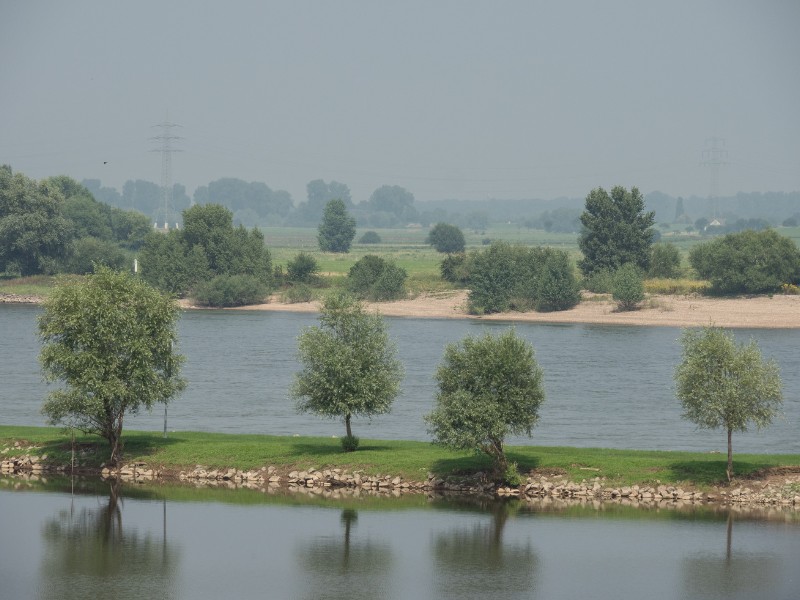
Day Trips From Duisburg, Germany
Here’s a compilation of day trips from Duisburg that promise enriching experiences and memorable adventures.
1. Cologne
Just a short train ride away, Cologne offers a blend of historical, cultural, and gastronomic delights. The city’s centerpiece, the Cologne Cathedral, is a stunning example of Gothic architecture. Cologne is also known for its vibrant art scene, numerous museums, and the lively Old Town. Don’t miss trying the local Kölsch beer in one of the traditional breweries.
2. Düsseldorf
Düsseldorf, the state capital, is renowned for its fashion industry, avant-garde architecture, and the bustling Königsallee shopping street. The Altstadt, or Old Town, is often referred to as “the longest bar in the world” due to its high density of bars and pubs. The city’s vibrant art scene can be explored through numerous museums and galleries. The Rhine embankment promenade offers splendid views and a pleasant atmosphere for a leisurely stroll.
3. Essen
Explore the cultural heart of the Ruhr area in Essen. The Zollverein Coal Mine Industrial Complex, a UNESCO World Heritage site, provides an intriguing look into the region’s industrial past. Essen is also home to the beautiful Grugapark, one of Germany’s largest and most picturesque city parks. The Museum Folkwang, with its impressive collection of 19th and 20th-century art, is a must-visit for art enthusiasts.
4. Xanten
Dive into Germany’s ancient Roman history at the Archaeological Park Xanten, the largest outdoor museum in the country. Here, you can explore the remains of the Roman city of Colonia Ulpia Traiana. Xanten’s medieval center, with its charming market square and the stunning Xanten Cathedral, is also worth exploring. The park regularly hosts events and reenactments, bringing Roman history to life.
5. The Netherlands: Venlo
A trip to Venlo in the Netherlands offers a change of scenery and a glimpse into Dutch culture, just across the border from Germany. The city is known for its historic center, vibrant market, and the Limburgs Museum, which showcases the region’s history and art. Venlo is also a great place for shopping and enjoying Dutch cuisine. The city’s location by the Maas River provides opportunities for scenic walks and bicycle tours.
6. Münster
Münster, with its historic old town, prestigious university, and numerous museums, offers a perfect blend of history and vibrant city life. The city is known as the “bicycle capital” of Germany, making it perfect for exploring on two wheels. The Prinzipalmarkt, with its iconic gabled houses, and the stunning St. Paulus Dom are must-sees. Münster is also home to the Peace Hall, where the Peace of Westphalia was signed, ending the Thirty Years’ War.
7. Aachen
Famed for its historic cathedral, where German kings were crowned, Aachen is steeped in history and royal legacy. The city’s thermal springs have attracted visitors since Roman times. Aachen’s charming old town offers cozy cafes, boutiques, and the impressive Aachen Town Hall. Don’t leave without trying the local specialty, Printen, a type of gingerbread.
8. The Rhine Valley
Embark on a scenic journey through the Rhine Valley, known for its breathtaking landscapes, medieval castles, and picturesque vineyards. The Rhine River Cruise provides stunning views of the Loreley Rock and numerous historic towns along the way. The valley is also a renowned wine-producing region, offering ample opportunities for wine tasting. The town of Bacharach, with its well-preserved medieval architecture, is particularly charming.
9. Bonn
Discover Bonn, the former capital of West Germany, rich in political history and cultural heritage. The Beethoven-Haus, birthplace of the famous composer, is a highlight for music lovers. The Museum Mile features several notable museums, including the Haus der Geschichte, focusing on Germany’s contemporary history. Bonn’s cherry blossom-lined streets offer a stunning spectacle in spring.
10. Teutoburg Forest
For nature enthusiasts, the Teutoburg Forest offers lush landscapes, hiking trails, and the famous Hermannsdenkmal, a monument commemorating the Battle of the Teutoburg Forest. The Externsteine, striking sandstone rock formations, are a natural wonder not to be missed. The area is also home to several charming small towns and historic spa resorts. It’s an ideal getaway for outdoor activities and relaxation.
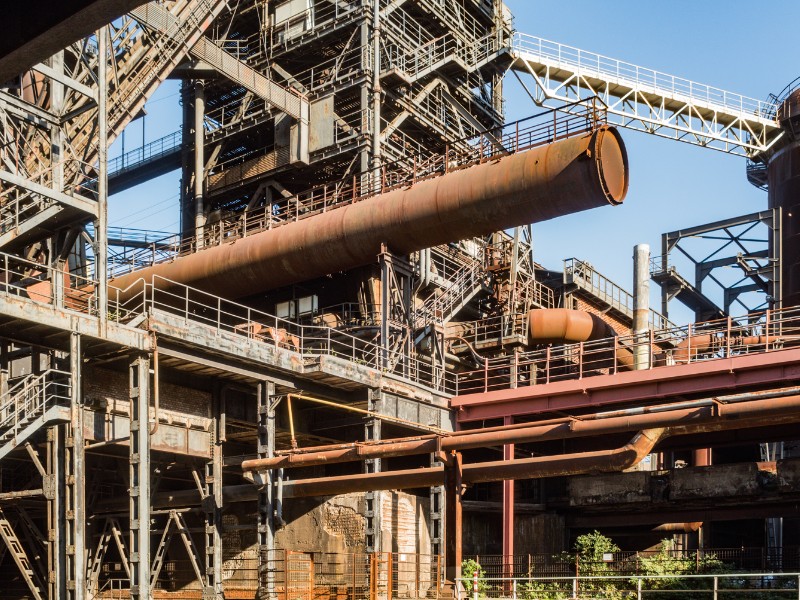
Duisburg Transportation Guide
Here’s a travel guide to getting around Duisburg:
1. Duisburg Stadtbahn (U-Bahn)
- The Duisburg Stadtbahn, often referred to as the U-Bahn, is an underground/subway system that serves the city and its surrounding areas. It’s a fast and convenient way to get around, connecting major districts, attractions, and the university.
- Key lines include the U79, which connects Duisburg to Düsseldorf, offering an easy commute between the two cities.
2. Trams (Straßenbahn)
- Duisburg’s tram network complements the U-Bahn, providing extensive coverage within the city. Trams are a scenic and efficient way to explore Duisburg, with several lines traversing major routes.
- Notable tram lines include Line 901, which offers a direct route through the city center and towards Mülheim an der Ruhr.
3. Buses
- A dense network of buses serves areas not covered by the U-Bahn or trams, ensuring comprehensive city-wide coverage. Bus stops are conveniently located and offer frequent services to residential areas, industrial zones, and neighboring towns.
- Night buses operate on weekends, providing safe transportation options during late hours.
4. Deutsche Bahn (DB) Regional and S-Bahn Trains
- For longer distances or trips to neighboring cities within the Rhine-Ruhr metropolitan area, Deutsche Bahn’s regional trains and the S-Bahn network are ideal. Duisburg Hauptbahnhof (main station) is a central hub for regional and long-distance travel.
- The S-Bahn line S1 connects Duisburg with other major cities in the Ruhr area, such as Essen and Dortmund, facilitating easy day trips and commutes.
5. Biking
- Duisburg is equipped with bike paths and lanes, making cycling a viable and eco-friendly option for getting around. The city is part of the NRW Radnetz (bike network), with designated routes for cyclists.
- Bike rental services, including those offered by Deutsche Bahn (Call a Bike), allow for flexible short-term use.
6. Car Sharing and Rentals
- For more flexibility, car sharing and rental services are available in Duisburg. These options are ideal for exploring the wider Rhine-Ruhr region or for when public transportation doesn’t suit your schedule.
- Major rental companies have offices at the Duisburg Hauptbahnhof and other convenient locations throughout the city.
7. Taxis
- Taxis provide a direct and convenient way to reach your destination, especially outside the operating hours of public transportation. Taxi stands are located at the Hauptbahnhof, major attractions, and shopping areas.
- Ride-hailing apps also operate in Duisburg, offering an alternative means of booking rides.
Transportation Tips:
- Ticketing: The VRR (Verkehrsverbund Rhein-Ruhr) offers a range of ticket options that cover buses, trams, U-Bahn, and S-Bahn within Duisburg and the broader Rhine-Ruhr region. Tickets can be purchased at stations, online, or via mobile apps.
- DB Navigator App: Useful for planning trips and purchasing tickets for regional trains and S-Bahn services.
- DVG Mobile App: The official app of Duisburg’s public transportation provider (DVG) is handy for route planning, timetables, and ticket purchases for local transit.

Where To Visit After Your Trip To Duisburg?
From historical cities and natural wonders to cultural hubs, here’s a list of places to visit after your trip to Duisburg, each offering its unique charm and attractions.
1. Cologne
Just an hour away, Cologne boasts a stunning Gothic cathedral, a vibrant arts scene, and the lively Altstadt (Old Town). The city is famous for its Kölsch beer, Carnival celebrations, and the Museum Ludwig, which houses a significant collection of modern art. Don’t miss a walk along the Rhine for picturesque views of the cityscape.
2. Düsseldorf
Düsseldorf, the state capital, is renowned for its fashion industry, cutting-edge architecture, and the Königsallee, one of the most luxurious shopping streets in Germany. The Altstadt offers over 260 bars and restaurants, earning it the nickname “the longest bar in the world.” The city also hosts the largest Japanese community in Germany, reflected in its excellent sushi restaurants and the annual Japan Day festival.
3. Essen
A key city of the Ruhr industrial region, Essen is home to the Zollverein Coal Mine Industrial Complex, a UNESCO World Heritage site that symbolizes the area’s industrial history. The city also offers green escapes such as the Grugapark and cultural venues like the Museum Folkwang, with its impressive collection of 19th and 20th-century art.
4. The Rhine Valley
For breathtaking natural beauty, head to the Rhine Valley, where you can explore medieval castles, vineyards, and picturesque villages along the Rhine River. Take a river cruise to see the legendary Lorelei rock and sample some of the world’s best Rieslings. The area is perfect for hiking, cycling, and wine tasting tours.
5. Aachen
Known for its historic cathedral, where German kings were once crowned, Aachen is steeped in history and European significance. The city is also famous for its thermal springs and the RWTH Aachen University, one of the largest technical universities in Germany. The Christmas market around the cathedral is one of the most beautiful in the country.
6. Münster
Münster is a charming city with a vibrant student population, known for its well-preserved medieval old town and the peace treaties of Westphalia. The city is considered Germany’s cycling capital, offering numerous bike paths and green spaces. The Prinzipalmarkt is a picturesque square surrounded by gabled houses and historic buildings.
7. Xanten
Delve into Germany’s Roman past at the Archaeological Park Xanten, where you can explore the remnants of the Roman city of Colonia Ulpia Traiana. The park offers insights into ancient Roman life through reconstructed buildings and interactive exhibits. Xanten’s medieval center and the stunning Xanten Cathedral add to the town’s appeal.
8. The Netherlands: Amsterdam
A bit further afield, Amsterdam awaits with its iconic canals, world-class museums, and vibrant nightlife. The city’s rich artistic heritage is on display at the Van Gogh Museum and the Rijksmuseum. Amsterdam’s open-minded culture and picturesque streets make it a must-visit European capital.
9. Belgium: Brussels
Just a few hours from Duisburg, Brussels, the heart of the European Union, offers stunning architecture, historic sites, and culinary delights like Belgian waffles and chocolates. The Grand Place is a UNESCO World Heritage site known for its ornate buildings and lively atmosphere. Don’t miss the Atomium and the Mini-Europe park for a unique experience.
10. Luxembourg City
Explore the blend of medieval, Gothic, and modern architecture in Luxembourg City, the capital of one of Europe’s smallest countries. The city’s fortress, the Casemates du Bock, offers spectacular views and a glimpse into Luxembourg’s strategic military significance. Despite its size, Luxembourg City is a cosmopolitan place with a diverse cultural scene.
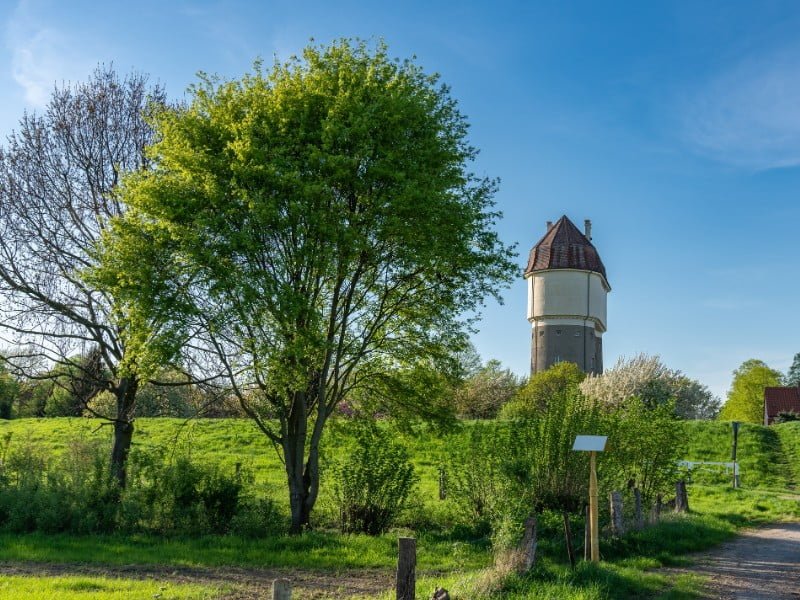
Essential Questions About Visiting Duisburg, Germany: Practical Answers, Local Tips & Ruhr-Style Surprises
Is Duisburg actually worth visiting, or should I just go to Cologne or Düsseldorf?
Absolutely. Duisburg isn’t trying to out-bling Cologne or out-fashion Düsseldorf. It’s a different vibe: industrial heritage turned into creative public spaces, surprisingly chill waterfronts, and big green pockets. If you like cities with an edge and a reinvention story, Duisburg is a rewarding stop—especially if you want something less obvious in the Ruhr.
How many days should I spend in Duisburg?
It depends. For most travelers, 1–2 days is a sweet spot. That gives you time for Landschaftspark, the Inner Harbour, a museum or two, and one standout viewpoint like Tiger & Turtle. If you’re using Duisburg as a base to explore the wider Ruhr or the lower Rhine, stretch that to 3 days.
What’s the single must-do attraction in Duisburg?
No contest: Landschaftspark Duisburg-Nord. It’s a former ironworks reborn as a public park where you can wander through industrial giants, climb viewpoints, and see the site glow after dark. The park is open 24/7 and free, which makes it easy to fit into any itinerary. The Visitor’s Centre has set hours if you want deeper context.
Can I really climb or dive at Landschaftspark?
Yes—this is one of the coolest “only in Duisburg” flexes. Climbing is possible with the right setup and registration for groups, and the park’s diving options are famous enough to pull in enthusiasts specifically for the gasometer experience. If you’re certified, you’ll want to check current schedules and booking requirements before you go.
What’s the best time of year to visit Duisburg?
Late spring through early autumn is easiest for outdoor exploring, cycling, and lake time. But winter has a strong case if you love festive energy: the Duisburg Christmas Market typically runs from mid-November through late December in the city center, with extended evening hours and plenty of family-friendly fun.
Is the Duisburg Christmas Market worth planning around?
Yes. It’s a lively, central, classic German market with good atmosphere and easy access. If you’re in the region in late November or December, it’s a fun add-on to a Ruhr itinerary—especially paired with an evening stroll through the Inner Harbour.
What’s special about the Inner Harbour (Innenhafen)?
Not really a “tourist trap” vibe—more of a relaxed, modern waterfront that shows how the city reinvented itself. It’s a great place for an evening meal, a casual walk, and museum-hopping. The mix of old industrial bones and newer architecture is very Duisburg.
Is the Port of Duisburg something tourists can experience?
Yes, in the right way. Duisburg is home to one of the world’s biggest inland ports, and that identity shapes the city’s DNA. Harbor or river tours can give you a unique perspective on the city’s logistics powerhouse vibe—very different from the romantic Rhine-cruise fantasy elsewhere.
What is Tiger & Turtle and is it free?
Absolutely. Tiger & Turtle – Magic Mountain is a walkable roller-coaster-style sculpture and viewpoint. It’s open day and night and free to visit. It’s especially fun at sunset or after dark when the structure lights up.
Where should I stay in Duisburg?
For convenience, we’d base ourselves near:
- City center (Innenstadt) for easy transit and walkability.
- Inner Harbour area if you want dining and a modern waterfront feel.
- Wedau/Sportpark area for greener, quieter stays near sports and lakes.
If you’re day-tripping around the Ruhr, being near Duisburg Hauptbahnhof can be a practical win.
How do I get to Duisburg from nearby cities?
Super simple. Duisburg sits in the Rhine-Ruhr transit web, so coming from Düsseldorf, Cologne, Essen, or Dortmund is usually straightforward by regional or intercity trains. If you’re traveling in winter 2025 into early 2026, keep an eye on any station works or temporary track closures that could affect routing.
What’s the easiest way to get around the city?
Public transport plus walking. Duisburg’s U-Bahn/Stadtbahn, trams, and buses cover the main neighborhoods and attractions, and the regional network makes day trips easy. If you like cycling, the city is set up for it, and the flatter routes along water and parks are especially pleasant.
Is Duisburg family-friendly?
Yes. Between the zoo, lake areas, playgrounds, interactive spaces, and the sheer “adventure playground” feel of Landschaftspark, it works well with kids. The Christmas Market season is also very family-oriented with rides and winter activities.
Is Duisburg safe for tourists?
Generally, yes—like most mid-to-large German cities, it’s fine with normal urban awareness. Stick to well-lit routes at night, keep an eye on your belongings in busy areas and stations, and you’ll likely have zero drama.
What local foods should I try in Duisburg?
Start with hearty regional staples like Bratkartoffeln and look for good versions of classic Ruhr-and-Rhineland comfort foods. But Duisburg’s multicultural backbone means you should also lean into the international scene—especially Turkish and other immigrant-rooted food cultures that are part of the city’s everyday identity.
Duisburg Travel Guide: Final Thoughts
We’ve reached the end of our Duisburg journey. Who knew this under-the-radar city could pack such a punch? From its awe-inspiring industrial landmarks to serene parks, buzzing multicultural districts, and rich history, Duisburg has unfolded before us as a city of unexpected discoveries. Let’s take a moment to reflect on why this Ruhr gem deserves a spot on your travel list.
More Than Meets the Eye
Duisburg has a way of surprising you. It’s not just about the industrial might of the past; it’s about how the city has repurposed these giants into spaces of creativity and leisure. The Landschaftspark Duisburg-Nord is a testament to this transformation, blending history with modern recreational use in a way that’s uniquely Duisburg.
A Cultural Mosaic
The city’s cultural diversity is one of its greatest treasures. Walking through Duisburg, you’re as likely to hear Italian, Turkish, or Arabic as you are German. This melting pot of cultures is reflected in the vibrant food scene, lively festivals, and the warm, welcoming nature of its people.
Green Escapes
Duisburg’s green spaces are a breath of fresh air, offering tranquil retreats from urban life. The Six Lakes Plateau isn’t just a place for relaxation; it’s a reminder of the city’s commitment to balancing urban development with nature conservation. These pockets of greenery in and around the city are perfect for anyone looking to reconnect with nature.
Gateway to Adventure
Finally, Duisburg’s strategic location makes it an ideal starting point for exploring the wider Ruhr area and beyond. Whether you’re drawn to the historic charm of Cologne, the art and fashion of Düsseldorf, or the natural beauty of the Rhine Valley, Duisburg serves as your gateway to a richer, more diverse exploration of Germany.
As we wrap up our travel guide, remember: Duisburg is a city that rewards the curious and the adventurous. So, pack your bags, bring an open mind, and discover the multifaceted city that is Duisburg. Who knows? It might just surprise you.

Ode To Duisburg
In Duisburg’s heart, where history breathes, A city of contrasts, where past and present meet. From industrial might to cultural delights, Duisburg’s essence, a traveler’s treat.
Stroll along the Inner Harbor’s lively embrace, Where boats dance and the water’s grace. Museums await, with art’s vibrant hues, MKM’s contemporary marvels, an artistic fuse.
Landschaftspark Duisburg-Nord, a playground of the past, Industrial relics transformed, a landscape vast. Climb the blast furnace, witness panoramic sights, Nature and industry, harmonious delights.
Duisburg Zoo, where creatures roam, Exotic wonders, a captivating home. The Town Hall stands tall, a historic sight, Step inside, behold its grandeur and light.
Salvatorkirche’s Gothic charm, Stained glass windows, a heavenly arm. Dine by the harbor, flavors aplenty, Savor local cuisine, a culinary journey.
Duisburg’s rhythm pulses through the night, Königstraße alive, city lights shining bright. Theater Duisburg’s stage, where stories unfold, Culture’s embrace, a tale to behold.
As you bid farewell, memories in tow, Duisburg’s spirit, a traveler’s glow. A city of resilience, past and present entwined, Duisburg, a destination, forever enshrined.
